Voxxed Days Luxembourg 2017
Expectations
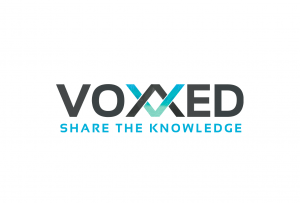
It was the first time that we were attending a Voxxed Days conference, my expectations where probably in the right place, I was anticipating it to be well organized and, while not having the same affluence as conferences taking place in bigger cities, I was expecting a well crowded event, especially given the speakers. I tried to not bias myself too much before going, so deferred making choices for talks to attend until the day of the conference. Pierre-Antoine Gregoire, one of the organizers, enticed us to attend in our last DevOps Luxembourg Meetup, so there we went!
Arrival
The Voxxed Days 2017 took place in Casino 2000 in Mondorf-Les-Baines in Luxembourg. There was ample space for parking and previously the organizers had shared alternative ways to come, mainly by bus. Mondorf is about 20 minutes south of the city of Luxembourg, and not a problem at all to travel too.
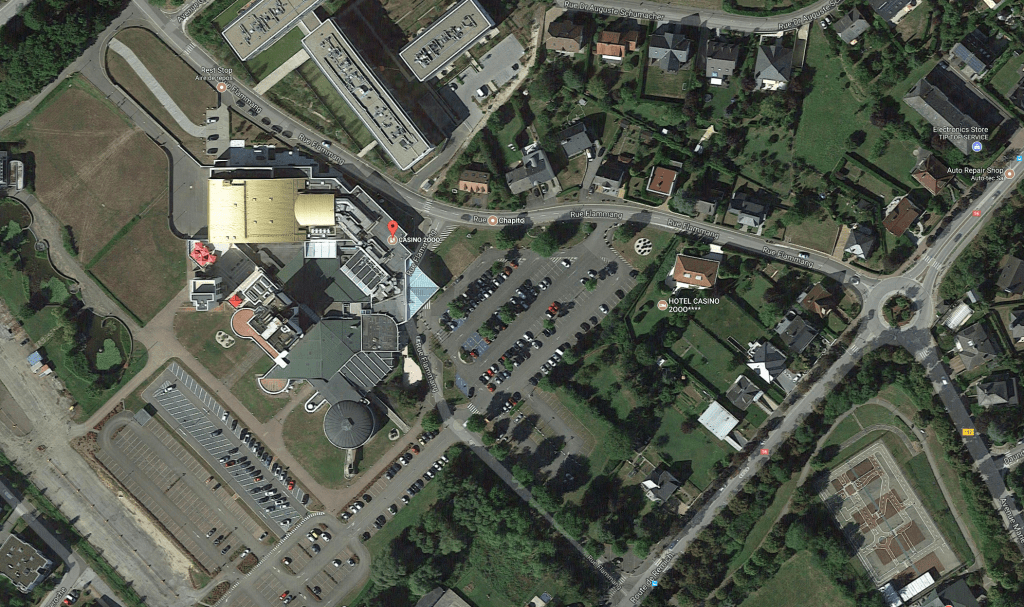
Setup
Once in the main hall, a leading corridor populated by the sponsors led to the keynote room, with the other rooms on the sides.
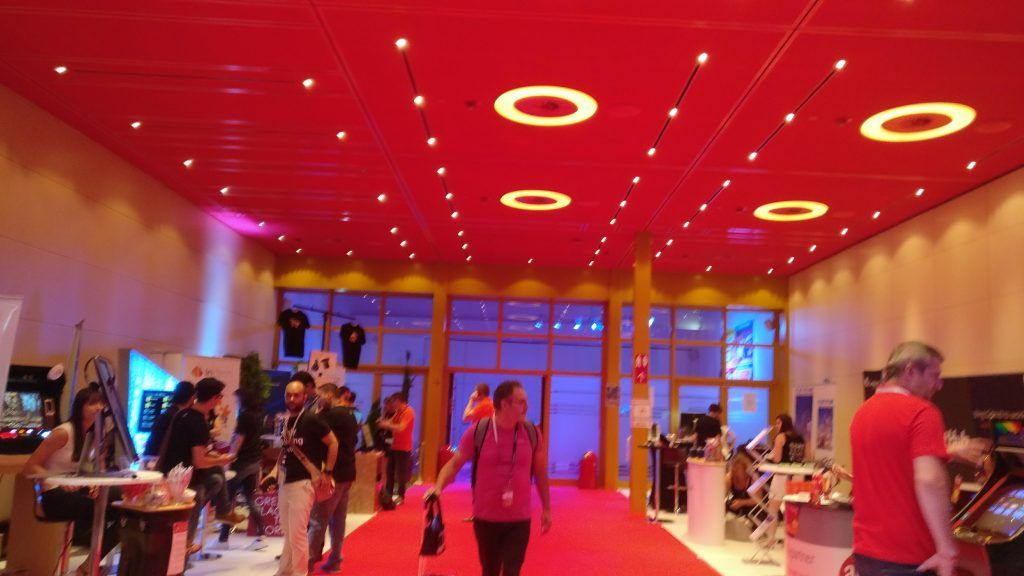
All in very compact, but easy to navigate and to go from one talk to another, or grab a drink, or visit the restrooms in a very short amount of time.
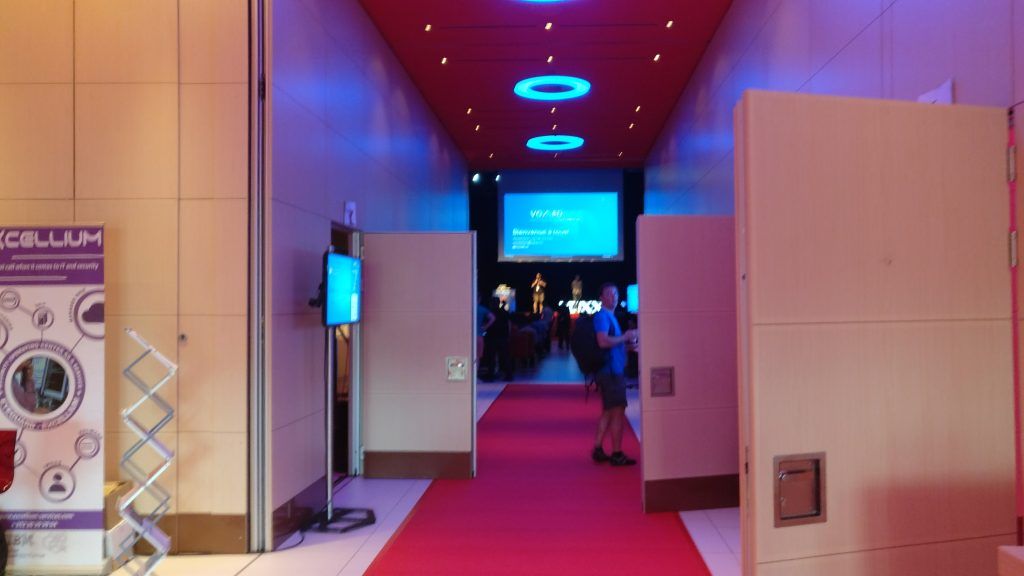
On arrival we were given the badge, a lunch ticket, and a goodie bag. I dismantled the goodie bag and I put it in my backpack. I really do not like to spend the rest of the day carrying a little bag with me.
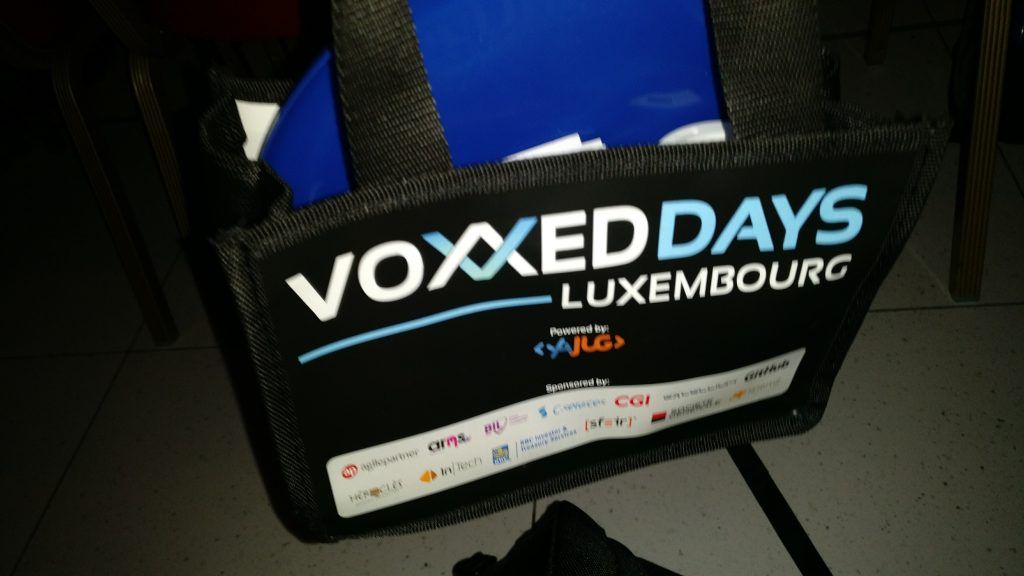
The breakfast was adequate, mainly coffee tea and fresh pastry, which actually were quite nice, but a bit more choice would had been appreciated.
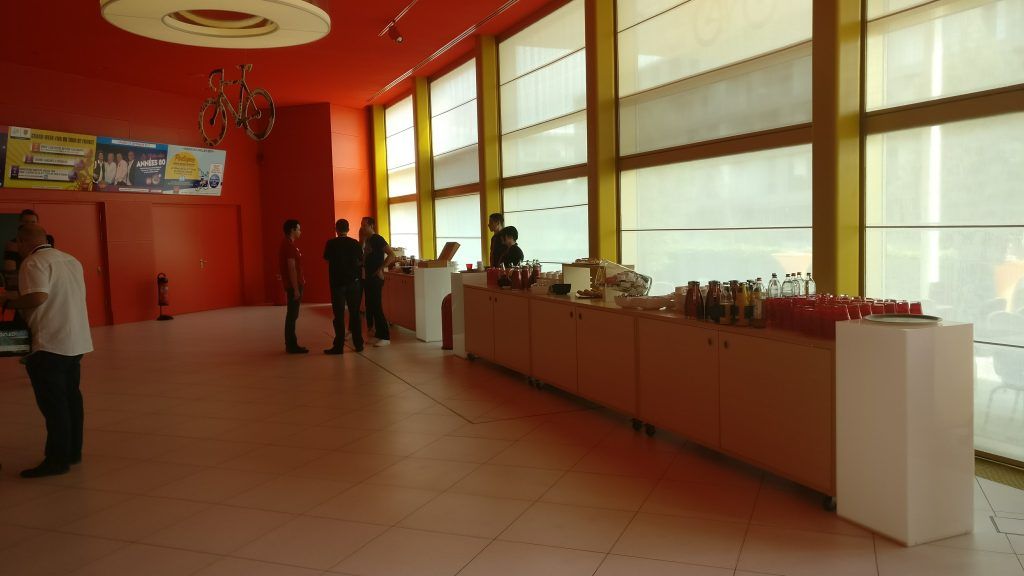
The sponsors, which where placed strategically to be found on arrival leading to the talk rooms, where discrete and would not interfere in the conference, which was very much appreciated. While Luxembourg business was fairly represented, there were few known tech brands, GitHub for example. There were some service companies, banks and other financial entities. Here you can see the full list.
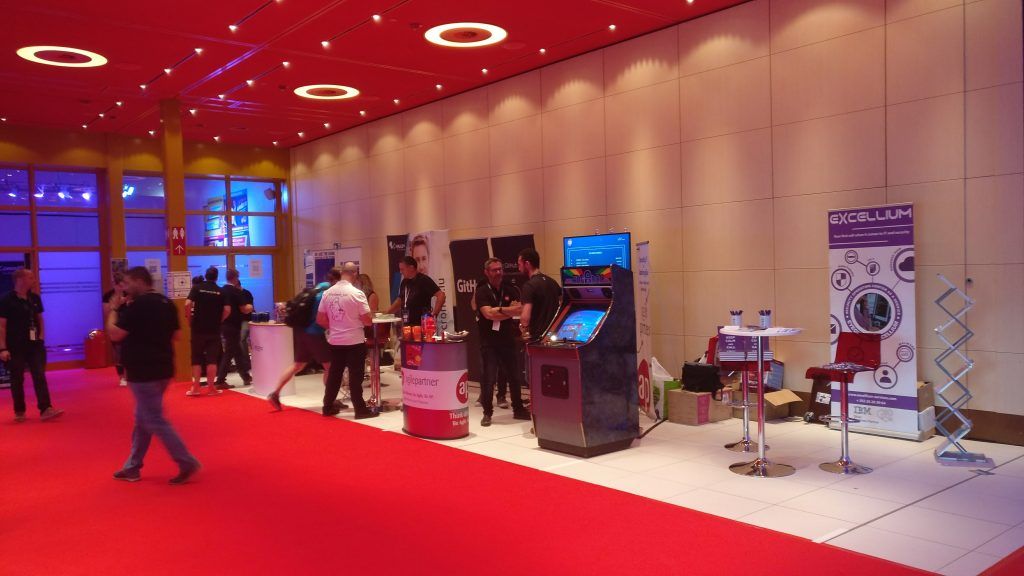
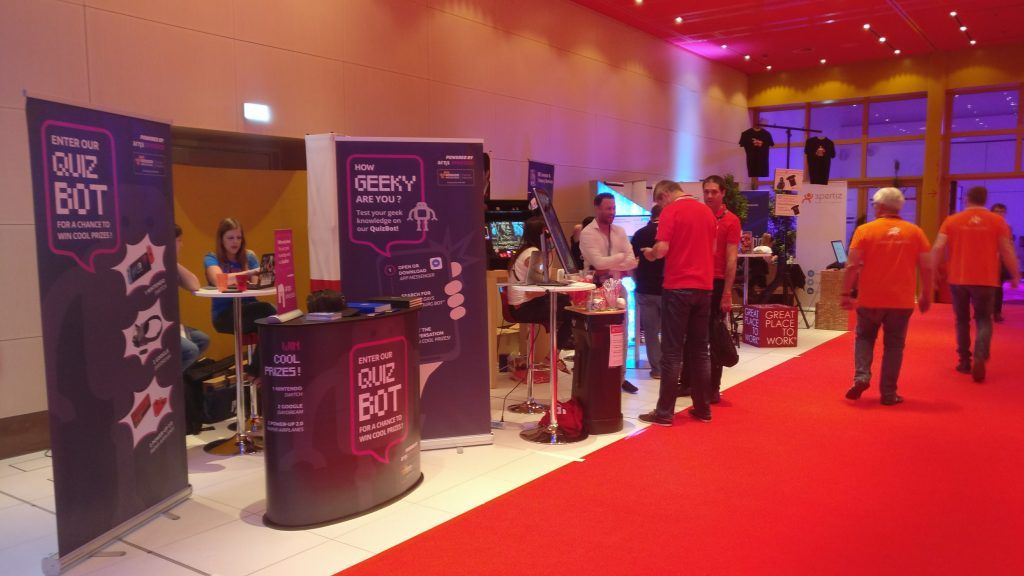
Something I was impressed with was that while there were some people taking pictures and recording the event, they did so in a very discrete way. Thee were other cameras distributed throughout the place, and there interviews conducted by Annabelle Buffart.
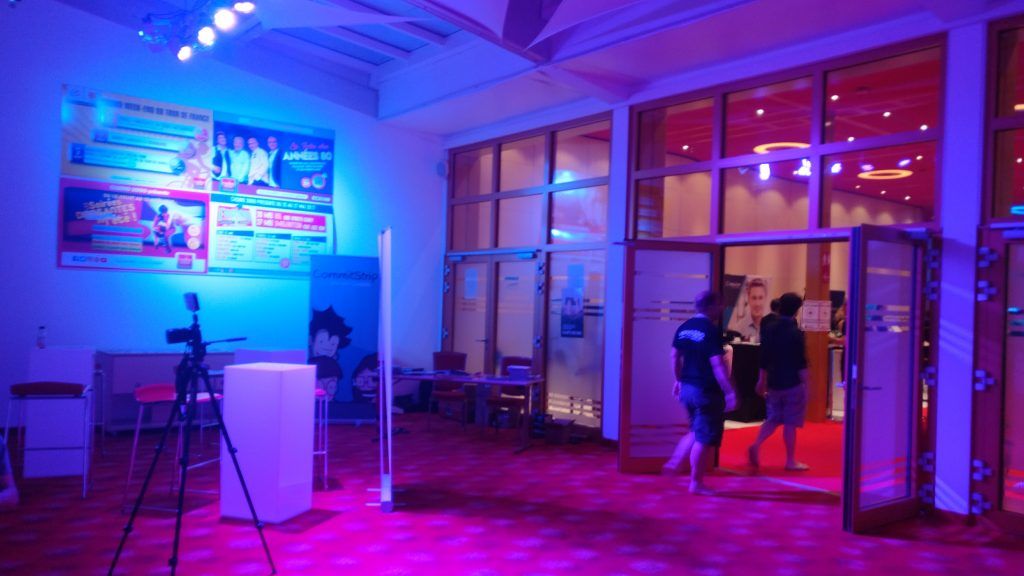
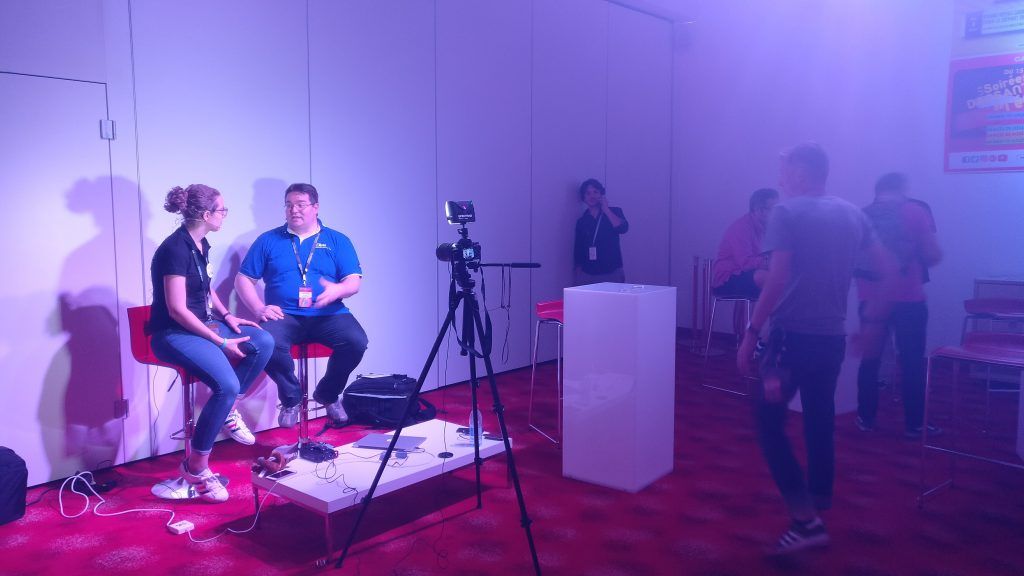
Is this camera powered on? Is it connected? Does it run on batteries? I think I own a tripod like that one!
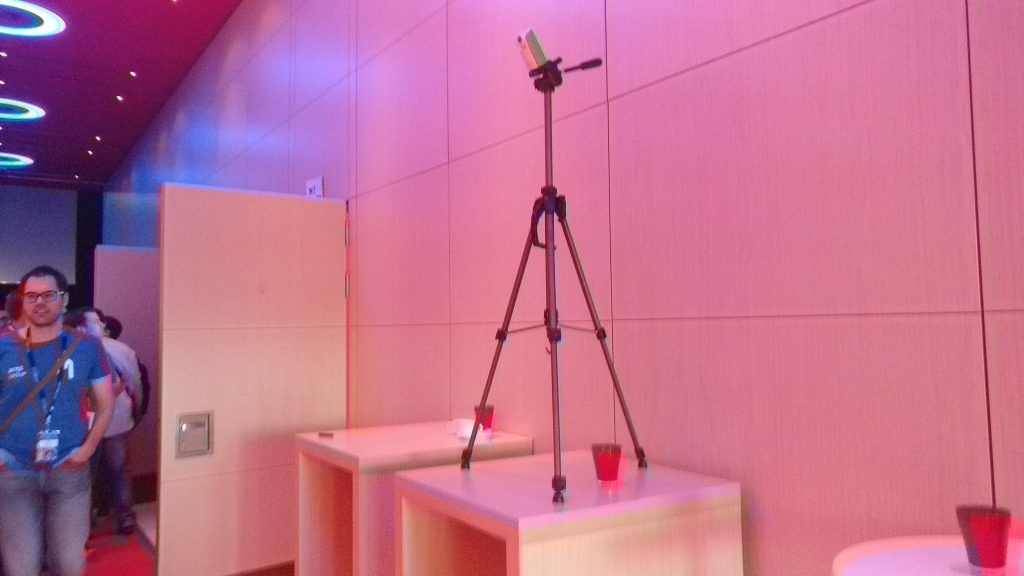
You could undoubtedly see the 13 organizers working all the time and very well communicated among themselves. It is clear that they knew what they were doing and the maturity and experience gained in past occasions was clear.
Intro
Pierre-Antoine gave a nice intro, gave the audience a recap of Voxxed Days, thanked the organizers, sponsors, speakers and attendees and gave way to the first talk of the day, about the difficulties of ethical data management, by Serge Abiteboul.
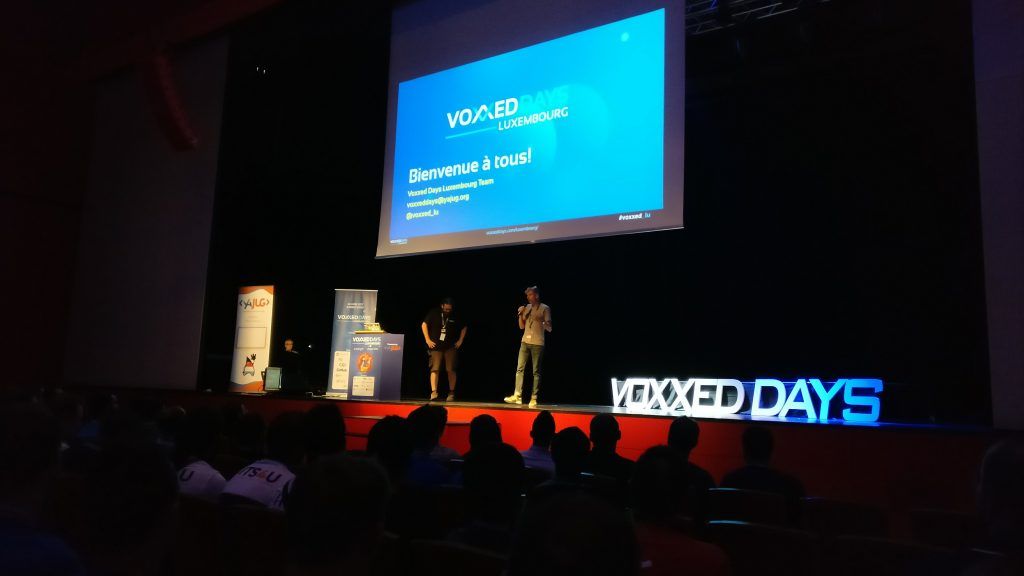
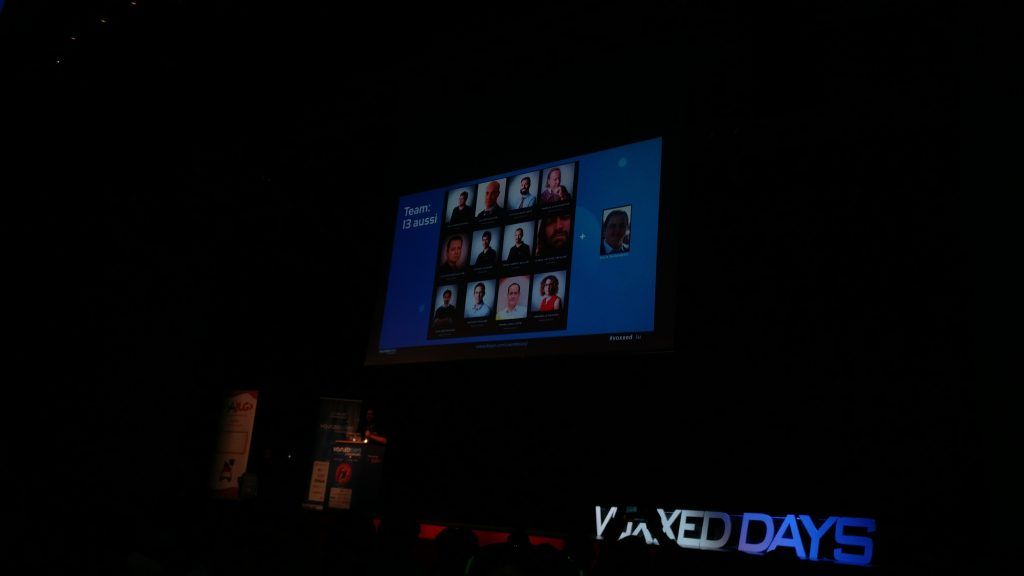
While it was a very interesting topic, I would not had chosen it to open the conference, as the content was dense, the presentation dull and the tone very monotonous. It may not help of course that I am not a native French speaker and that the first keynote was one hour of French. I will for example enjoy the the presentation much more offline, when I can read it and understand it well.

What I would had appreciated more would had been two key notes, one in French another one in English, shorter and more focused on visuals -especially with the big projector screen- than a solid talk.
Talks attended
Introduction to gRPC, by Mete Atamel and Ray Tsang
This was a great talk that I found reignited the interest and brought quickly the focus back to technology after the opening keynote. Mete and Ray presented in tandem gRPC, a revival of RPC for backend to backend communication and showed live coding how to create a server and a client in Java and .Net, with both resulting clients being able to open multiple instances and talk using the same service. Apparently they had presented this separately before but now they had the opportunity to present it together.
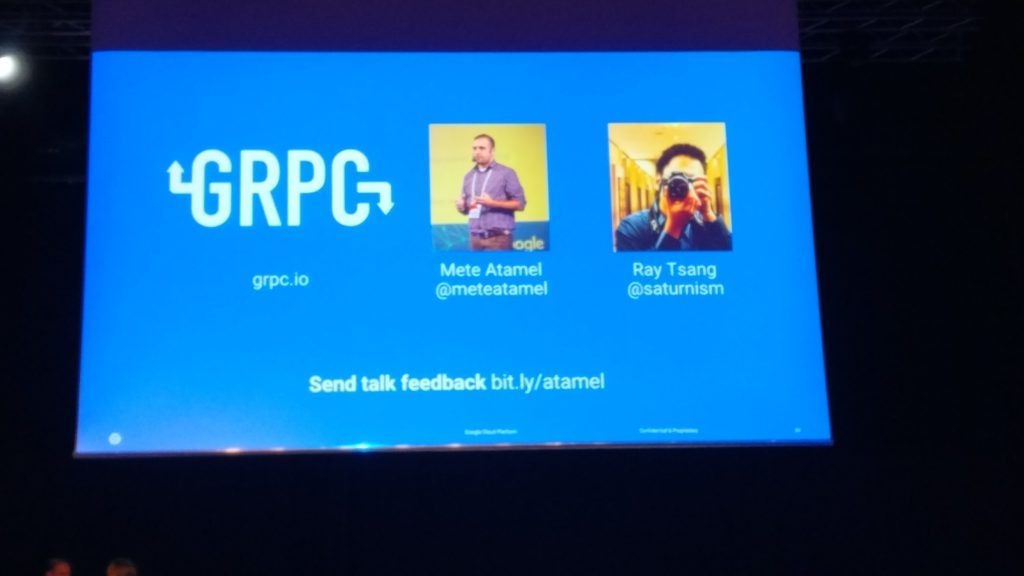
So gRPC present as a contender to REST APIs in the sense that still can be used by many languages to talk to each other, while compressing the messages sent and taking advantage of HTTP/2 protocol. This gives gRPC extreme performance gains compared with REST.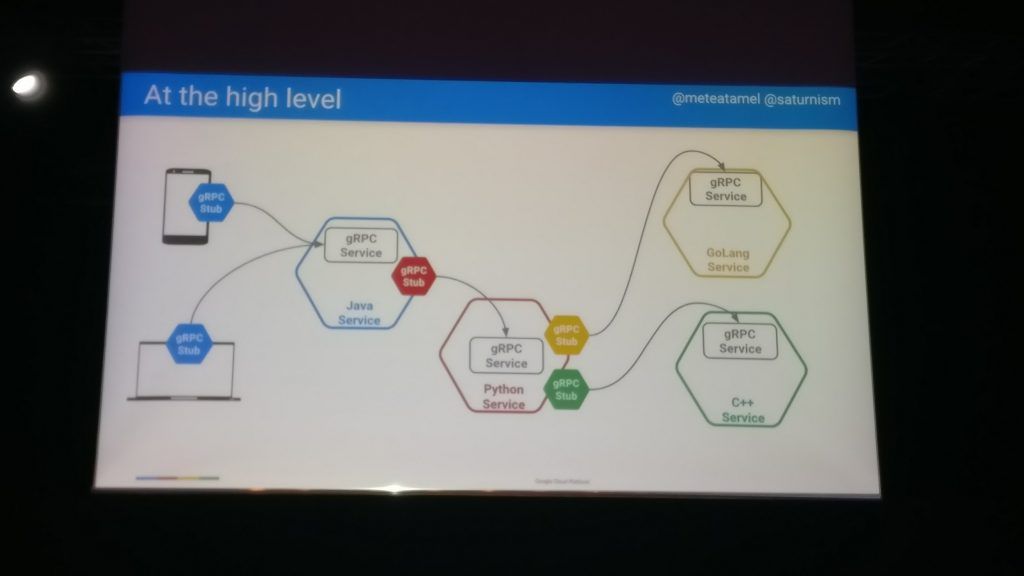
The messages sent get codified with numbers instead of sending plaintext. That codification is of course pr-arranged in server and client sides, so if 1 means the USER string, instead of having to send the plaintext USER, it just sends 1.
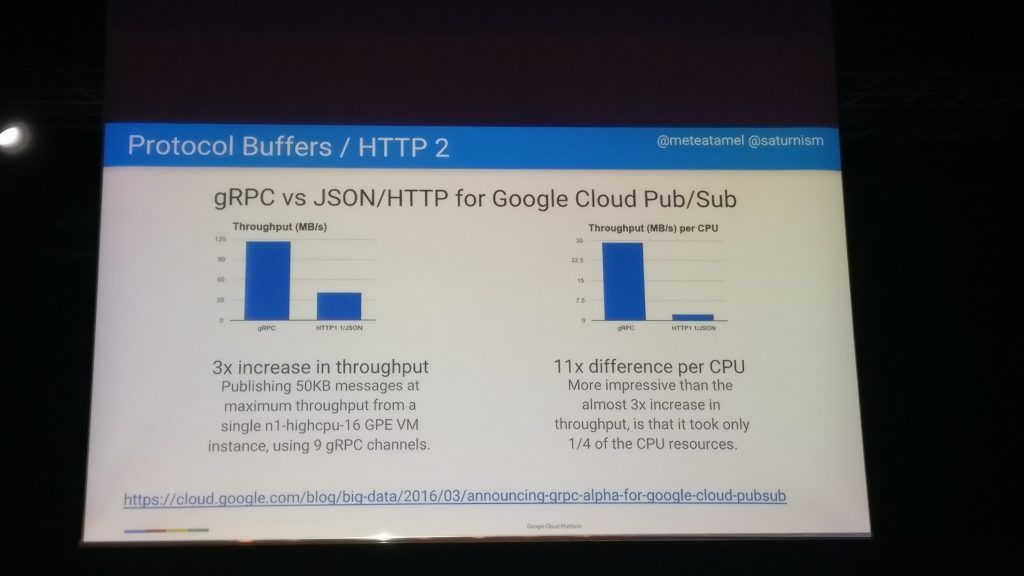
I had the opportunity to catch up with Ray a bit later, he is a great character.
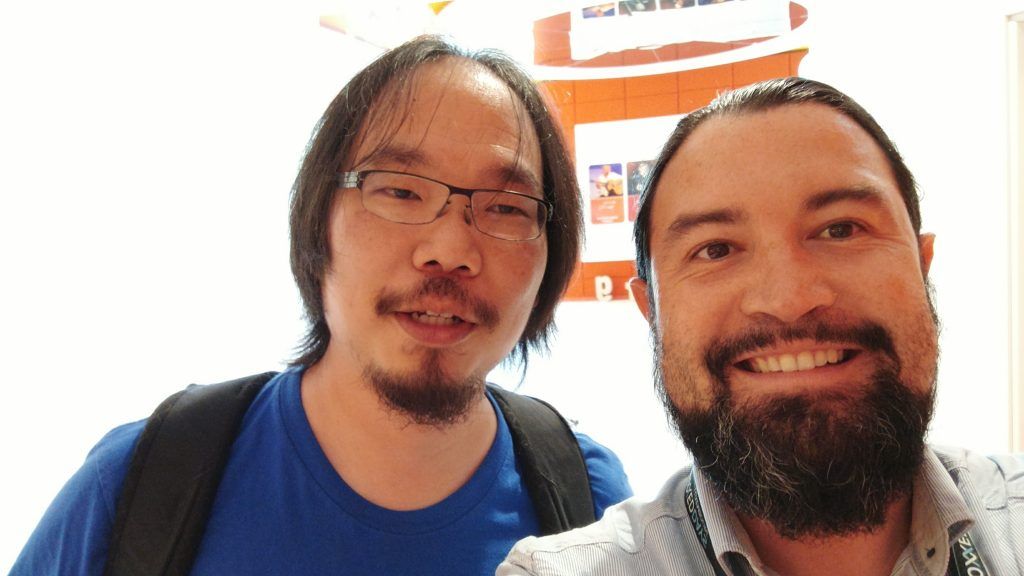
Java EE – The most lightweight enterprise framework?, by Sebastian Daschner
Sebastian postulated to the audience why the old EJB and other parts of Java EE have given it a title of heavy weight framework. He explained how with good coding practices and combining only the necessary parts Java EE can actually be at least as performant as its competitors while still be regarded as the most stable and standard implementation, treats which many big companies are attracted to.
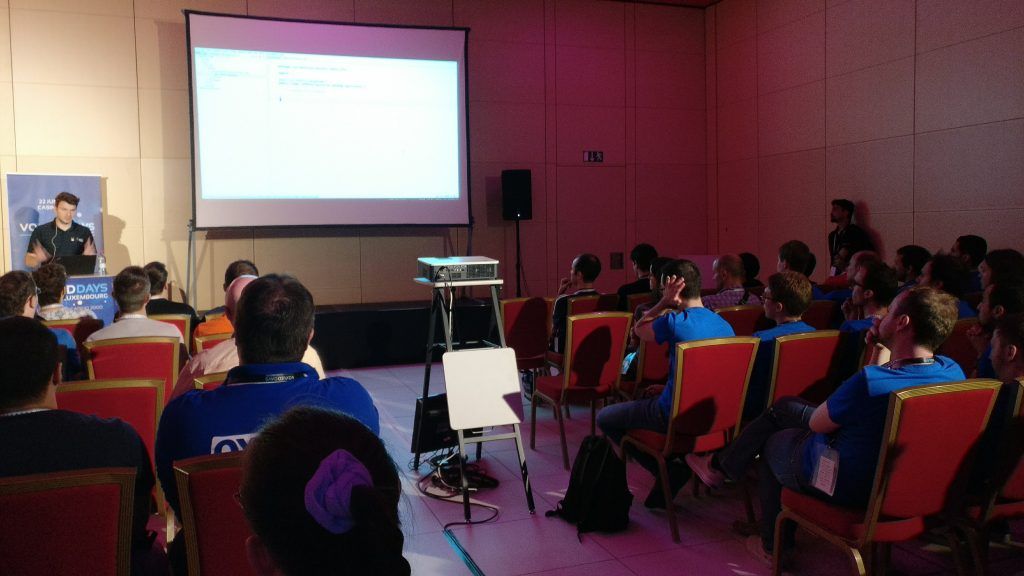
Sebastian mainly showed us code, almost no slides and was very opinionated about certain aspects and use of Java frameworks, and while I did not agree with all of them — do we really have to put everything inside a container this days? — it was great so see WildFly being used for his demo. Solid talk, very informative, very clear.
Migrating to Micro service Databases, by Edson Yanaga
This was a great talk. I had the opportunity to talk to Edson just before his talk and he was really nice. Edson brought up his experiences migrating from monolithic DB to Micro service oriented DB and also many strategies to do column migrations , breaking down the advantages of each case. He was great presenting, I would say the most balanced between content, entertainment and professionalism of the whole talk, and one from whom I think I learnt the most.
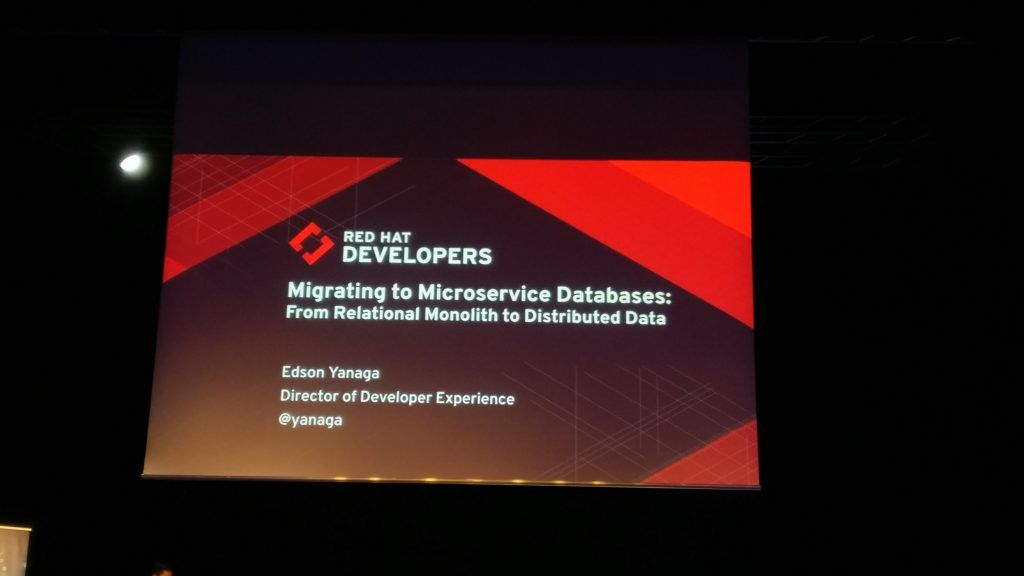
Edson talked about some of the content in his book “Migrating to Microservice Databases”. I think that the works container and microservices are mandatory in any book cover to be sold this year.
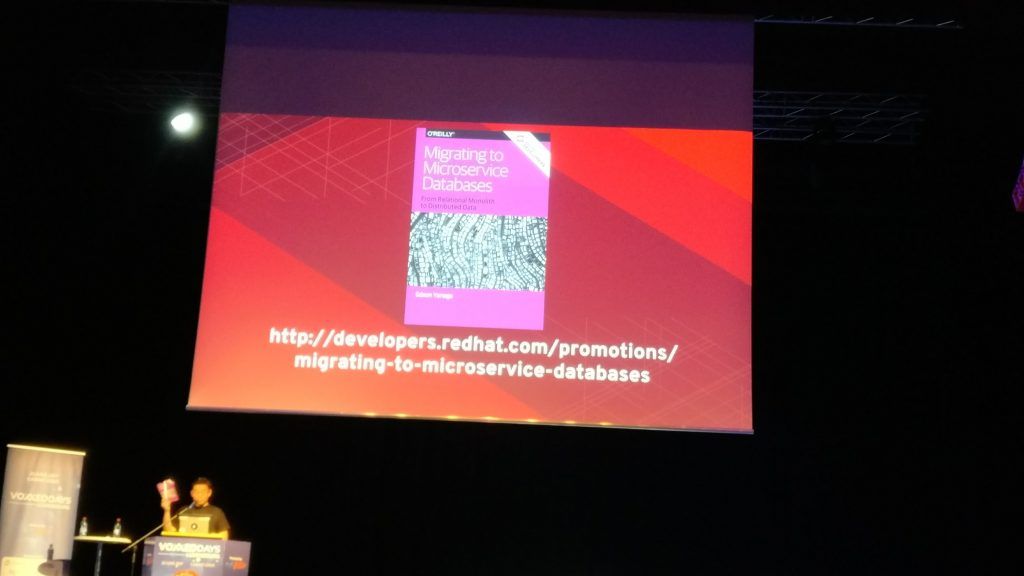
Some recommended source control and migration control solutions for database that were suggested by Edson, Flyway and Liquibase. We will definitely have a look at those!
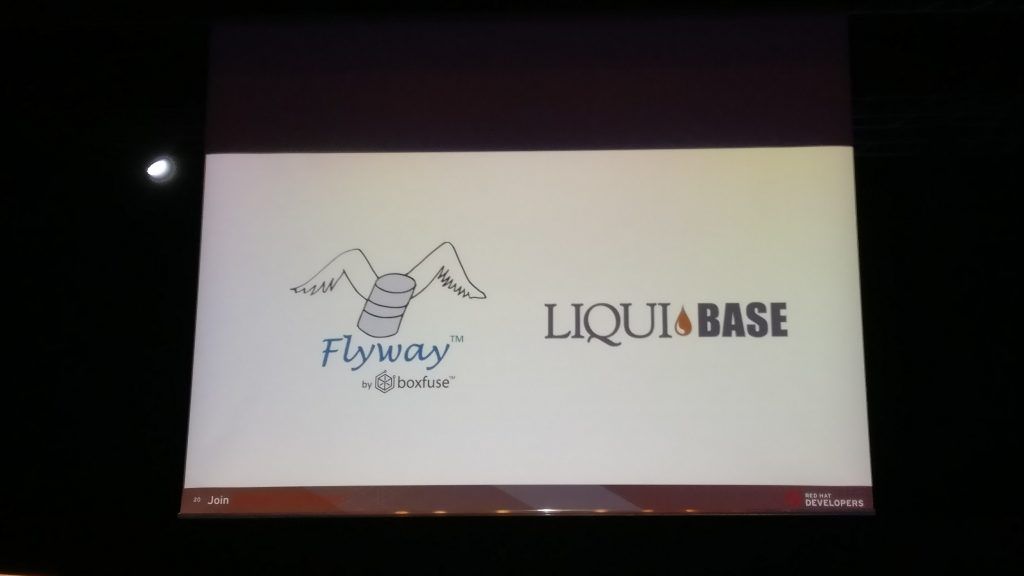
Cloud Native Java, by Josh Long
Josh started making the audience laugh, he continued doing so during his presentation and closed also with humor. It was probably the most entertaining talk that I saw and I actually saw people laughing really hard during the almost the whole time. Josh showed, almost then entire time switching from presentation to IDE, how to quickly deploy applications using Springboot and Cloud Foundry. It was mesmerizing to see someone typing so fast and making IntelliJ fly with the shortcuts.
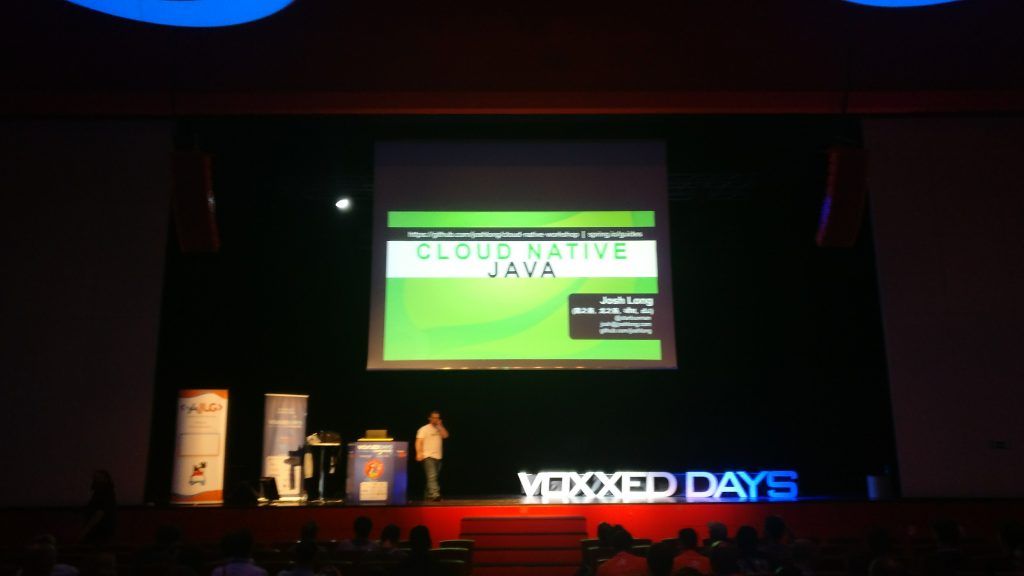
I had a special interest in this talk, as one of our clients is soon migrating to Pivotal. It definitely gave broader picture of what is to come and what to expect for the new shift of paradigm. As I wrote in a previous post, we are witnessing the end of the sysadmin – who becomes an operator, using glue code to join prefabricated building blocks to create the infrastructure – and the absolute raise of the developer for who the new cloud solutions, like AWS, Google Cloud Engine or Pivotal Cloud Foundry, are centered on. Basically, if it is not about the business code, it needs to be standardized, per-fabricated and standard-ly deployed. Only the business code matters, the operative environment is a commodity to a point that is almost given for granted, as you give for granted electricity or hot water.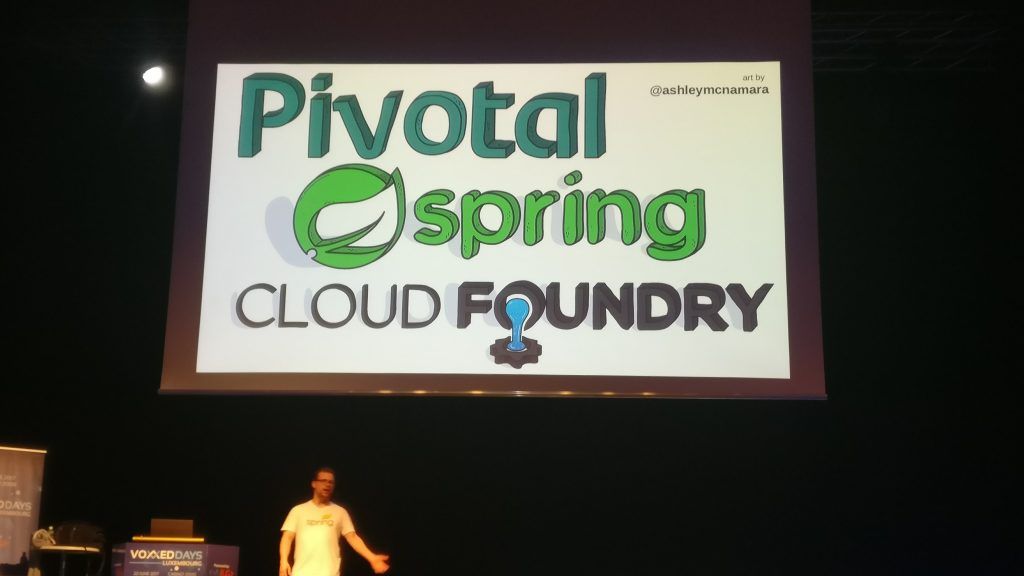
Is this new model better? Well it does really many advantages, and it really aligns to what I would cherish as part of Netdevops philosophy: making the change easy. Easy for the final user who gets its service or product, easy for the developer who does not need to know, and easy for the sysadmin operator, who just needs to glue stuff together. But there is a fundamental part missing which does not align with our line of work. We do value knowing how things work. How to set up SSL, how a load balancer works, and setting up the operative environment. It is not about doing those things manually, it is about possessing the know-how to extend them and tune them though automation and configuration management so they bring an edge to our customers and actually give the real value to them.
Josh assured me that the sysadmin operator can still do that inside the PCF world, by going to the components and change them. Or write better glue code or extensions. But, you see, all this already happens inside a constrained box, with some rules that cannot be bet in order to keep the easy-peasy way. For me, learning how PCF works, especially cf and bosh, will be the interesting part, as it has been so far to work with AWS.
I did not attend any other talks, as I engaged in a long talk with Josh Long about Pivotal Cloud Foundry and the current trend. I was not able to attend the later function at the end as I was constrained and eager to join the traffic jams in the motorway back to the city.
Josh was extremely generous and gave me a solid hour of his time and shared lots of his knowledge about Cloud Foundry in general and PCF ways in general. He listened to each and every of my arguments and questions – whoever knows me personally has had a dose of my inquisitiveness – and he showed me and gave me good arguments for each point, even if i would not agree to all of them. Josh if you read this, a big thanks.
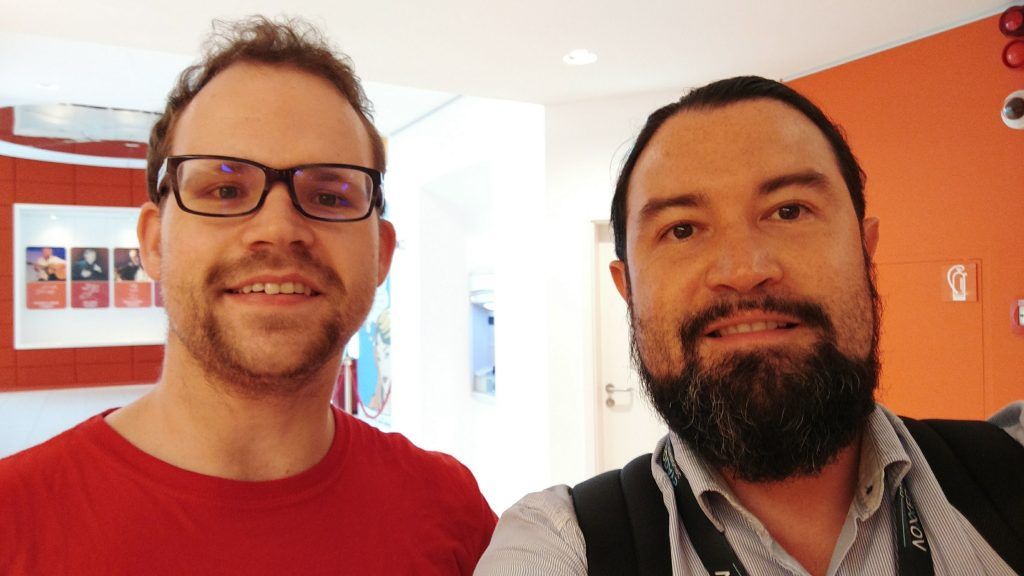
Overall Impressions
Overall the Voxxed Days Luxembourg were very well organized, it had great speakers and a very nice venue. It shows that it benefited from maturity from past it churns a decent audience. The ambience was definitely fun, distressed an not dominated by commercial interests. The speakers were approachable and very engaged with their topics.
Some things that could had been better, but that do not detract from a great experience would be the following:
The program or calendar should be better or bigger, it was difficult to read it as the print was small and the light conditions in the venue were almost never optimal.
The goodie bag, should be either optional when registering and then it should be picked at any given time not just at the registration. The bag should be also big enough to carry other stuff, so it is useful. I know it is not a easy problem to solve, but there we go.
Something that I found interesting was that two thirds of the talks were in French. Of course that being one of the main languages in Luxembourg, makes sense. However it also meant that most of the attendees were native French speakers. While that worked well within those boundaries, I thing that given that the workforce in Luxembourg is very international, I would had liked to see at least the half of the talks being in English.
All in, a great, great experience to which I am looking forward next year and that gives us lots of encouragement for the organization of a successful DevOps Days in Luxembourg next November.
Thanks to Pierre Antoine to recommend our presence and to all the Voxxed Days 2017 organizers and speakers.
